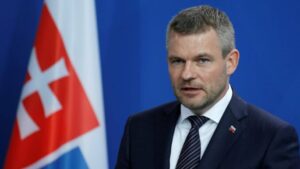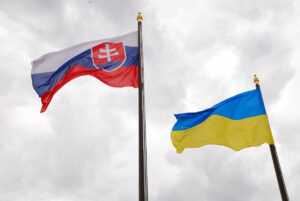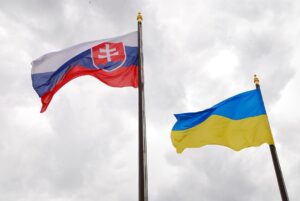
Populist Peter Pellegrini has been elected president of Slovakia, replacing liberal Zuzana Kaputova.
Pellegrini, 48, defeated pro-Western Ivan Korc, a former diplomat, with 53% of the vote.
A former prime minister, he is an ally of Prime Minister Robert Fico and shares his dovish attitude toward Russia.
Mr. Fico and his allies now control Slovakia’s parliament, government, and soon the presidency.
Slovakia was one of Ukraine’s most staunch allies before Mr. Fico came to power in October, promising to stop supplying military supplies to the Slovak army in Kyiv. With Mr. Pellegrini’s election to replace Ms. Kaputova, Ukraine finally lost its voice of support in the EU and NATO capitals.
Mr. Fico called for an end to Western military support for Ukraine, an immediate ceasefire and peace talks with Moscow. He said that President Vladimir Putin had recently been “unfairly demonized” and claimed that Ukraine’s acceptance into NATO would mean the start of World War III.
Mr. Pellegrini’s campaign has echoed this Moscow-friendly rhetoric, accusing Mr. Korcok of being a warmonger who would send Slovak soldiers to fight in Ukraine, a constitutional power the president does not have.
On Sunday, Mr. Pellegrini promised to “ensure that Slovakia remains on the side of peace, not on the side of war.”
“You don’t have to worry that the presidential palace, as it has been for the last 10 years, will become the center of an opposition, opportunistic power that will harm the government, that will harm the state abroad and that will rejoice in the failures of the Slovak government,” he said.
After Ms. Kaputova resigns in June, Slovakia, a country that only a year ago handed over its entire fleet of MiG-29 aircraft to Ukraine, will no longer have a single high-ranking official who unequivocally supports Kyiv’s efforts to defend its territory by force.
Mr. Korchok expressed his outrage at Pellegrini’s campaign tactics, saying that it was fear that decided the outcome of the election, and “this fear was spread by those who hide in public office.”
He said of the result: “It turns out that it is possible to become president of the Slovak Republic not only by spreading hatred, stirring up passions and pushing people to the barricades, but also by portraying the opposite number, that is, me, as a war candidate. I will not forget this.”
The liberal, pro-Western opposition also accuses Mr. Pellegrini – as head of the coalition Voice party and speaker of parliament – of remaining silent as Mr. Fico destroyed Slovakia’s criminal justice system, in particular by abolishing the Special Prosecutor’s Office, which was created 20 years ago to investigate serious corruption and economic crimes.
It had investigated a number of high-ranking officials from Mr. Fico’s Smer party and overseen the prosecution of those believed to be responsible for the 2018 murders of investigative journalist Jan Kuciak and his fiancée Martina Kusnirova.
The murders were a seismic event in Slovak politics. The aftermath ended Mr. Fico’s second term as prime minister in 2018 and led to the election of the liberal, pro-Western Zuzana Kaputova as president, riding a wave of popular anger against official corruption and organized crime.
Robert Fico’s government recently targeted Slovakia’s public broadcaster, submitting plans to eliminate it and replace it with virtual state control. These plans were shelved after Peter Pellegrini’s unexpectedly poor result in the first round of the presidential election two weeks ago.
The opposition fears that a renewed Robert Fico will resubmit them – and they say that President-elect Pellegrini is unlikely to stand in his way.

The state enterprise “Forests of Ukraine” has signed an agreement to supply 110,000 pine and spruce seedlings with a closed root system (CRS) to Slovakia, said the company’s CEO Yuriy Bolokhovets.
“We are replacing raw material exports with products of our own production. (…) We are negotiating the purchase of seedlings with a number of clients. Not only European ones,” he wrote on Facebook.
Bolokhovets recalled that for the first time, the Lviv Seed Breeding Center of the State Enterprise “Forests of Ukraine” exported seedlings in 2022. The feedback from European customers was positive. Therefore, in 2023, the state-owned enterprise again received a large contract.
The CEO of the state-owned enterprise noted that one of the advantages of planting material from the SCA is the ability to plant it almost all year round, which greatly simplifies the work of foresters. At the same time, the cost of creating a forest is reduced by 35%. After all, modern plants require much less seeds, fertilizers, space, and post-planting maintenance, as seedlings with SCA have more growth energy.
Currently, forest seed plants of the State Enterprise “Forests of Ukraine” operate in Zhytomyr, Ternopil, Khmelnytsky, Lviv, and Kirovohrad regions. This year, another center in Ivano-Frankivsk region has already been launched.
“Our goal is to produce 40 million seedlings per year with SCA. Most of them are intended for Ukraine, but we plan to increase exports as well,” summarized the CEO of the State Enterprise “Forests of Ukraine”.
As reported, Ukraine launched a forestry reform in 2016. As part of it, the sale of raw wood at electronic auctions has already been introduced. Since 2021, an interactive map of wood processing facilities has been operating in a test mode in a number of regions.
The industry has implemented the Forest in a Smartphone project, which contains a list of logging tickets for timber harvesting and allows you to check the legality of logging on the agency’s online map.
On June 1, 2023, Ukraine launched a pilot for the electronic issuance of logging tickets and certificates of origin of timber. In addition, the State Enterprise “Forests of Ukraine” has launched a pilot project to procure timber harvesting services through the electronic platform Prozorro.

Minister of Internal Affairs of Ukraine Igor Klymenko held a meeting with Ambassador of the Slovak Republic in Ukraine Marek Shafin, during which the parties discussed issues of bilateral cooperation, the press service of the Ministry.
” Igor Klymenko held a meeting with Ambassador Extraordinary and Plenipotentiary Ambassador of the Slovak Republic in Ukraine Marek Shafin. They discussed issues of bilateral cooperation and support of Ukraine in resisting Russian armed aggression. In particular: Transfer of Bozena mechanized demining vehicles for the State Emergency Situations Service this fall, which will facilitate the process of demining of Kherson region”, – stated in the message published in the Telegram channel on Tuesday.
In addition, the parties discussed the search for relatives of people who went missing, the exchange of experience with international partners in this area, as well as the preparation of readmission agreements, the fight against crime and cooperation in the field of chemical, environmental and nuclear safety on the border.
The interlocutors also discussed issues of migration policy, because at the moment about 130 thousand Ukrainian citizens are officially staying in Slovakia.
The meeting was also attended by the Deputy Head of the Ministry of Internal Affairs Kateryna Pavlichenko, Police Attaché, official representative of the Ministry of Internal Affairs of Slovakia at the Embassy of the Slovak Republic in Ukraine Ludvik Šoltes and representatives of the Ministry.
Ihor Klymenko, Minister of Internal Affairs, SLOVAKIA, UKRAINE, Марек Шафін

The meeting between Ukrainian Prime Minister Denys Shmyhal and Slovak Prime Minister Robert Fico will take place on Wednesday, January 24, in Uzhhorod, Slovak media outlet Denník N reported on Saturday.
“…on Wednesday morning, I am in Ukraine with Shmyhal,” Fico said, speaking about his work plans for the coming week.
The publication reports that “Fico will meet with the Prime Minister of Ukraine in Uzhhorod.”
As noted, in early December, Fico already had a telephone conversation with his Ukrainian counterpart. He summarized the content of the phone call in his Facebook status, saying that he “makes it impossible to supply weapons” but “supports the European perspective of Ukraine and Moldova, but together with the countries of the Western Balkans.” Fico also stated that Slovakia is interested in “helping Ukraine in the humanitarian and civilian sphere.”
Fico also reportedly noted the reluctance of the Ukrainian side to hold a press conference.
Last week, it was reported that Ukrainian Prime Minister Shmyhal also announced a meeting with Slovak Prime Minister Fico in the coming weeks to “discuss all the pressing issues and remove possible obstacles to the implementation of the Ukraine Facility.”

Slovakia will donate humanitarian aid to Ukraine totaling €203,492, which will include power generators and heaters, the Slovak Ministry of the Interior reports.
“Based on Ukraine’s request for humanitarian aid, as well as the European Commission’s call for member states to show solidarity with the civilian population affected by the military conflict, the Slovak Republic will provide humanitarian aid to Ukraine totaling €203,492,” the Ministry of the Interior said in a statement published on its website.
The cargo of humanitarian aid will weigh 21 tons and will include power generators, heaters, clothing and first aid kits from the stocks of the Headquarters of the Ecumenical Pastoral Service in the Armed Forces of Slovakia and the Armed Forces of the Slovak Republic, as well as food, bottled water and clothing from the stocks of the Slovak Ministry of Internal Affairs.
It is noted that the Ministry of Health of Ukraine, the Ministry of Internal Affairs of Ukraine, the regional enterprise Donetskteplocomunenergo, and the city council of Pokrovsk, Donetsk region, will receive the aid.

According to information received by Ukrainian border guards on the evening of December 14, representatives of Slovak carriers unblocked truck traffic entering Slovakia at the Vysne Nemecke checkpoint for an indefinite period of time, the State Border Guard Service of Ukraine reported on its Telegram channel.
“Since the end of the blockade, as of 09:00 on December 15, almost 60 trucks have been cleared to leave Ukraine through the Uzhhorod checkpoint, and another 1065 are in the electronic queue to leave Ukraine,” the statement said.
As reported, on December 11, Polish carriers ended the blockade in front of the Dorohusk-Yahodyn checkpoint.
The Union of Road Carriers of Slovakia (UNAS) blocked truck traffic through the only border checkpoint with Ukraine, Vysne Nemecke-Uzhhorod, from 15:00 on December 11.